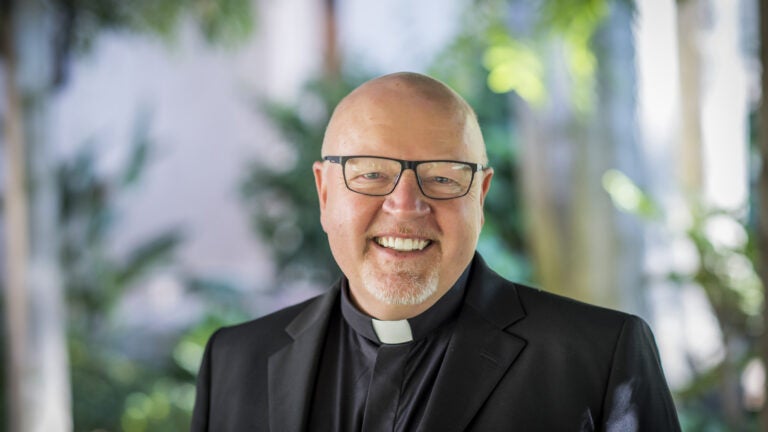
A Welshman finds a new home in the City of Angels
Dorian Llywelyn is Welsh. As Welsh as poet Dylan Thomas (with whom he shares a home town), coal mines (where his grandfather worked) and sheep (which his other grandfather raised for a living). He hails from Swansea and spoke the native language, Cymraeg, as his first. He is the first to admit he is “almost a clichéd version of a Welsh person.”
But Llywelyn, the newly appointed president of the Institute for Advanced Catholic Studies (IACS) at the USC Dornsife College of Letters, Arts and Sciences, has led a life that is anything but a trope. He has lived in Indonesia, Egypt and Spain, worked as an administrator for an avant-garde theater group in Wales and studied at Cambridge University, the Pontifical University of Salamanca, Spain, and the Jesuit School of Theology in Berkeley, California, before settling down to an academic life in Los Angeles. Now he hopes to draw on his worldly experience to shape IACS into a modern, outward-facing institute.
“Overall, I believe the Catholic intellectual tradition has much to offer contemporary thought, but contemporary thought and experiences also have much to offer the Catholic tradition,” he said.
From Swansea to Indonesia
Llywelyn was born to what he describes as a working-class family in Swansea. Although several family members were teachers and he grew up understanding the importance of education in life, the transition from home to his college studies at Cambridge challenged him.
“It was a big jump, going from a working-class background to an elite university,” Llywelyn said. The biggest shock? “Height,” he answered. Although Llywelyn is of average size for a Welshman, he found himself to be far shorter than his English peers.
The first in his family to get a college degree, Llywelyn then set out for a six-year stint in Voluntary Service Overseas, which he described as the British version of the Peace Corps. He spent two years in Egypt and four in Indonesia, during which time the idea of a vocation in the priesthood began to take shape.
“In both of those places I felt sort of an itch. But when you’re that age, you’re still envisioning a lot of different versions of yourself,” he said. So he stayed in the secular world a little longer, returning to Wales to spend two years as the administrator for an avant-garde theater company.
But the “daydream” of the priesthood was still there, and at age 30 Llywelyn entered the seminary, becoming the first Welsh Jesuit since the end of the 17th century. The previous one, David Lewis, was hanged, drawn and quartered for treason, he said. Lewis had been running an underground college for training Catholic priests at a time when being a Catholic priest and a Jesuit was an “offense against the state,” Llywelyn said.
“Fortunately, he died at the point where he was being hanged, so he wasn’t disemboweled alive like some people who underwent this,” Llywelyn noted.
A transcontinental religious education
After entering the priesthood, Llywelyn initially served as a pastor at a parish in Wales, but he soon decided to pursue graduate studies in Berkeley. Llywelyn faced his second sizeable transition, from the United Kingdom to the United States.
“I’ve lived in nine countries now, but I think the transition into the U.S. was one of the hardest,” Llywelyn said. Because the two nations more or less share a language, Llywelyn had thought their cultures would be quite similar, as well. The U.S., however, was more multicultural than he had believed. After finishing a fellowship at Stanford University, Llywelyn took a job at Loyola Marymount University in L.A. and has lived in California since.
A speaker of seven languages — Welsh, English, French, Spanish, colloquial Arabic, Indonesian, Italian and Javanese, with Latin and Greek also in his toolkit — Llywelyn has found that the multicultural nature of L.A. suits him, especially since part of his plans for IACS involve more interaction with local communities.
“I’ve always liked the hybrid version of having one foot in academia and one outside,” he said. “Academia is at its best when it engages the local community.” He noted the example of Lewis, who in addition to training priests had also tended to the needs of poor workers in the early days of the Industrial Revolution.
In 21st-century L.A., such community engagement might mean performing more outreach with different cultural groups and producing more content in languages other than English, he added.
Within USC itself, Llywelyn hopes IACS will interact more with different departments and disciplines throughout the university, particularly in areas like the sciences, where there traditionally has been less engagement.
“Because of the secular nature of a large institution like USC, it’s a great place to do all sorts of work. I’m especially interested in the dialogues between faith and science or faith and reason, which are part of the Catholic intellectual tradition,” he said.
While his roots will always be in Wales, Llywelyn said he has found a true home in L.A., especially enjoying its beaches, hiking trails and classical music performances, the last of which he hopes to attend again in person once the COVID pandemic ends.
“L.A. is like none other. Silicon Valley and London are fascinating, but to my mind I’m an Angeleno by adoption,” he said.